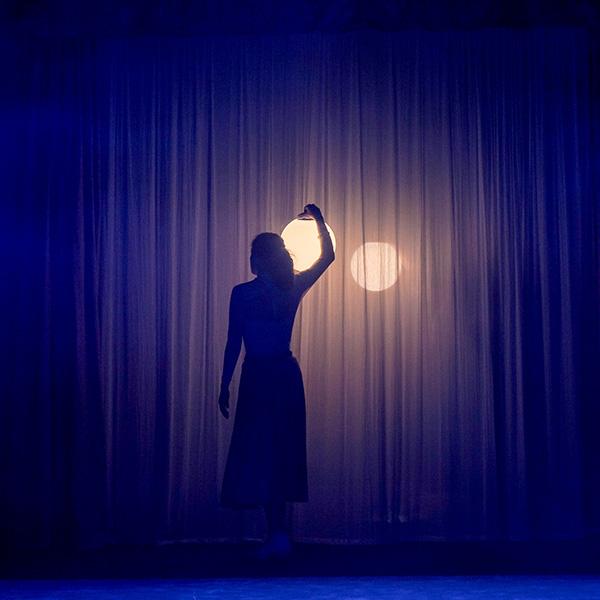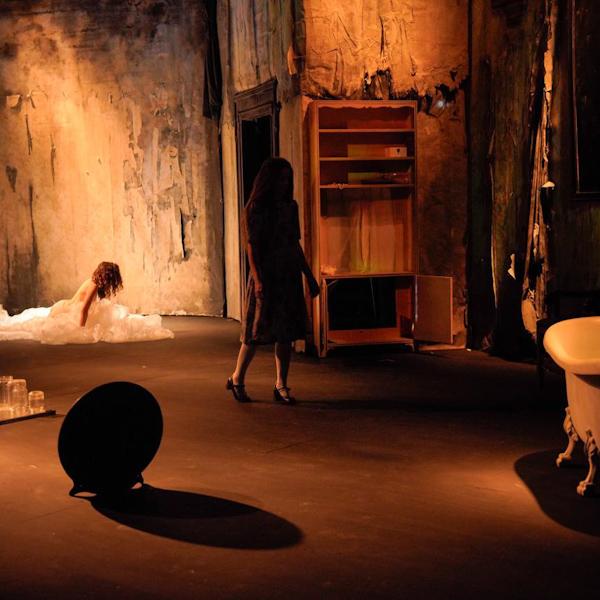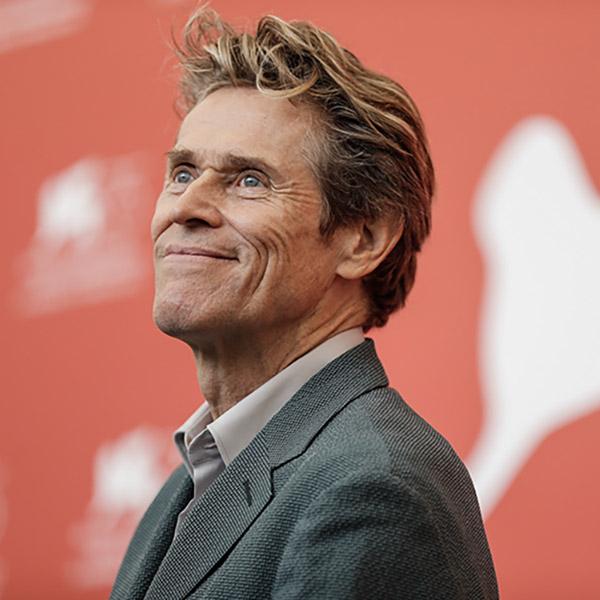
The 2025 Lion awards for Theatre
The Golden Lion for Lifetime Achievement goes to the director and playwright Elizabeth LeCompte (June 1); the Silver Lion goes to the Swiss actress Ursina Lardi (June 14).
The awards
Elizabeth LeCompte, the founder and director of the Wooster Group, is the Golden Lion for Lifetime Achievement for Biennale Teatro 2025. Swiss thespian Ursina Lardi, actress and author of theatre with a strong political commitment, is the recipient of the Silver Lion.
The decision was made by the Board of Directors of La Biennale di Venezia at the recommendation of Willem Dafoe, Director of the Theatre Department.
The awards ceremony will take place during the 53rd International Theatre Festival (31 May > 15 June) in Sala delle Colonne at Ca’ Giustinian, the Biennale headquarters. Elizabeth LeCompte will receive the Golden Lion for Lifetime Achievement Sunday 1 June; Ursina Lardi will be awarded the Silver Lion on Saturday 14 June.
Elizabeth LeCompte
Golden Lion for Lifetime Achievement
“This is a personal, individual and at the same time collective story” reads Willem Dafoe’s motivation for the award of the Golden Lion for Lifetime Achievement to Elizabeth LeCompte.
The long artistic journey of the director, or as she likes to define herself “theatre creator” LeCompte, is forever linked to that of the Wooster Group, the historic company she founded with Spalding Gray in the early 1970s. This was the era of off-off-Broadway, permeated with the experimentation of the Living Theatre or Joseph Chaikin, while New York protested against the war in Vietnam. After taking possession of a post-industrial space in SoHo, on Wooster Street, reinvented to become a theatre, Elizabeth LeCompte built a creative journey that would be recognised and appreciated by Richard Foreman, Bob Wilson, Peter Sellars, Susan Sontag, Mikhail Baryshnikov, Sam Shepard and many others.
“Integrating the codes of music, painting, dance and the media – continues the motivation – Elizabeth LeCompte composed works that were met with great acclaim by audiences and critics worldwide and often fiercely debated, but would increasingly characterise what would become a reference point for avantgarde theatre over the decades. Since the 1970s and 80s, Elizabeth LeCompte has influenced creation for the theatre and opened it to the political and cultural debate, pursuing a consistent and unwavering path founded on extensive study and innovative technique – always centred on the integration of modern technology with the physical art of the actor, within a mise en scène of her design. In her many years of leadership, the director and author has taken on the classics and original texts, working constantly with the company to develop them (sharing the same salary equally with everyone else), and directing over fifty different productions. Theatre is a ‘physical action’, says LeCompte, to be proudly and obstinately practiced outside of the American production system, in an ongoing battle for creative independence, both individual and collective. After being honoured with the prestigious MacArthur Fellowship, the order of Chevalier des Arts et des Lettres by the French Government, and countless other awards, Elizabeth LeCompte will receive the Golden Lion of Biennale Teatro 2025.”
The Wooster Group directed by Elizabeth LeCompte will open the 53rd International Theatre Festival on Saturday May 31st and in repeat on Sunday June 1st with the European premiere of Symphony of Rats (Teatro alle Tese, Arsenale), a production that after almost forty years, brings back to the stage a famous play by Richard Foreman, who recently passed away.
Ursina Lardi
Silver Lion
“Radicalness and empathy”: these are the words with which Willem Dafoe defines the career of Ursina Lardi, the recipient of the Silver Lion.
“An actress of consistently intense depth, ready to take risks and embrace directorial approaches based on different perspectives – reads the motivation – Ursina Lardi is defining her own creativity as an actress in increasingly authorial terms. In all the characters she has played – from Einar Schleef’s Salomé to Fassbinder’s Maria Braun, from Ljuba in Chekhov’s The Cherry Orchard, to many others – Ursina Lardi has had the infinite grace and painful insight to infuse great humanity into every line, every nuance of the texts, both classical and contemporary. Her stage presence gives her body the power to become not only an absolute theatrical mechanism, but also testimony and perhaps even a challenge, the ultimate political body. In her collaboration with the director Milo Rau in particular, Ursina Lardi has made her own individual story a collective one, taking upon herself, lucidly and with dignity, the contradictions of the bourgeois and capitalist West, almost as if the actress were, again and always, an incarnation of her own time. In the tenderness of a smile or the bitter terror of a glance, Ursina Lardi embodies the thousand nuances of an era on the brink of desperate collapse and at the same time reveals the possibility of a resistance that is not only artistic, but political and human as well. For this reason, and for the commitment with which she will undoubtedly take on times to come, turning theatre into the critical mirror of civilisation, Ursina Lardi is the recipient of the Silver Lion of Biennale Teatro 2025”.
Ursina Lardi will appear on stage at the 53rd International Theatre Festival on Thursday June 12th for the Italian premiere of Die Seherin (The Seer), that she wrote together with Milo Rau (repeat performance on Friday June 13th).
The awards of the previous editions
Over the years, the Golden Lion for Lifetime Achievement in Theatre has been awarded to Ferruccio Soleri (2006), Ariane Mnouchkine (2007), Roger Assaf (2008), Irene Papas (2009), Thomas Ostermeier (2011), Luca Ronconi (2012), Romeo Castellucci (2013), Jan Lauwers (2014), Christoph Marthaler (2015), Declan Donnellan (2016), Katrin Brack (2017), Antonio Rezza e Flavia Mastrella (2018), Jens Hillje (2019), Franco Visioli (2020), Krzysztof Warlikowski (2021); Christiane Jatahy (2022); Armando Punzo (2023); and Back to Back Theatre (2024).
The Silver Lion, dedicated to promising young artists in theatre, or to the institutions that have distinguished themselves for cultivating new talents, has been awarded to Rimini Protokoll (2011), Angélica Liddell (2013), Fabrice Murgia (2014), Agrupación Señor Serrano (2015), Babilonia Teatri (2016), Maja Kleczewska (2017), Anagoor (2018), Jetse Batelaan (2019), Alessio Maria Romano (2020), Kae Tempest (2021); Samira Elagoz (2022); FC Bergman (2023); and Gob Squad (2024).
Biographical notes
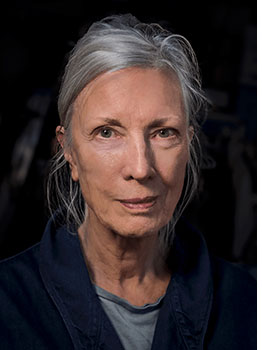 Elizabeth LeCompte (New Jersey, 1944) is an American director of experimental theater, dance, and media who co-founded The Wooster Group at The Performing Garage in Soho, New York City. She has directed the Group since its emergence in the mid-1970s. She earned a Bachelor of Science degree in Fine Arts from Skidmore College. With The Wooster Group, LeCompte has composed, designed, and directed over fifty works for theater, dance, film and video. These works characteristically interweave performance with multimedia technologies and are strongly influenced by historical and contemporary visual arts and architecture. She is known both for dissecting and reconstituting classics such as Shakespeare’s Hamlet, Eugene O’Neil’s The Emperor Jones and The Hairy Ape, and Brecht’s The Mother, as well as composing new works, such as Poor Theater and The Town Hall Affair. Prior to her work with The Wooster Group, LeCompte was a member of Richard Schechner’s The Performance Group with actor Spalding Gray from 1970 to 1975. In 1975, LeCompte and Gray began making their own work, starting with Sakonnet Point. Subsequently, LeCompte and Gray, along with Jim Clayburgh, Willem Dafoe, Peyton Smith, Kate Valk, and Ron Vawter, formally founded The Wooster Group in 1980. In 1986, Peter Sellars invited LeCompte and the Group to be in residence at the American National Theater/Kennedy Center where they performed two works from their repertory, LS.D. (...Just the High Points…) and North Atlantic, and began development of a new work based on Flaubert’s Temptation of St. Antony. Invitations to present the work in Europe began around the same time. This led to a consortium of European presenters, including Kaaitheater in Brussels, Theater Am Turm in Frankfurt, the Vienna Festival, and the Hebbel Theater in Berlin, who in the early 1990s commissioned a major series of Wooster Group works – including Brace Up!, based on Chekhov’s Three Sisters, and its sequel Fish Story. Also during the 1990s, media pieces by the Group were included in three successive Whitney biennials. In 1997, the Group rehabilitated an abandoned Broadway theater for performances of their production of The Hairy Ape. Continuing to tour in Europe, the Group made its first of eight appearances at the Festival d’Automne à Paris in 2001. The Museum of Modern Art in New York commissioned LeCompte and the Group to make a performance to close its 2005 Dada exhibition, which became Who’s Your Dada?!. In 2009, LeCompte directed her first opera production, La Didone with Wooster Group performers alongside opera singers and a baroque musical ensemble. Mikhail Baryshnikov engaged LeCompte to open his new arts center in New York City with the 2010 remount of North Atlantic, followed by Tennessee Williams’ Vieux Carre. Over fifteen years in the early 2000s, the Group also presented nine of its works at St. Ann's Warehouse in Brooklyn. In 2012, the Group was commissioned by the London Cultural Olympiad to collaborate with the Royal Shakespeare Company on a production of Troilus and Cressida. Sustained touring of the Group’s work to Asia began in 2014, with engagements in Hong Kong, Shanghai, Singapore, Taipei, Gwangju, Yokohama, Kyoto, and Tokyo over the decade that followed. The Whitney Museum selected the Group to create a ribbon cutting ceremony for the opening of its new building in 2015. In 2016, LeCompte was invited by the Adam Mickiewicz Institute, Poland, to create a work in honor of Tadeusz Kantor’s centenary, which resulted in the production A Pink Chair (In Place of a Fake Antique). In 2023, LeCompte was selected as the Artist in Focus for the Festival International Neue Dramatik at the Schaubühne, Berlin. Among her honors, LeCompte has received the National Endowment for the Arts Distinguished Artists Fellowship for Lifetime Achievement in the American Theater, the MacArthur Fellowship, the Chevalier des Arts et des Lettres from the French Cultural Ministry, a Guggenheim Fellowship, a Rockefeller Foundation Fellowship, a United States Artists Fellowship, an Anonymous Was A Woman Award, the Theater Practitioner Award from Theatre Communications Group, The Skowhegan Medal for Performance, a Doris Duke Artist Award, and honorary doctorates from the New School for Social Research and the California Institute of the Arts. She won the 2016 Dorothy and Lillian Gish Prize and was elected to the American Academy of Arts and Sciences in 2023.
Elizabeth LeCompte (New Jersey, 1944) is an American director of experimental theater, dance, and media who co-founded The Wooster Group at The Performing Garage in Soho, New York City. She has directed the Group since its emergence in the mid-1970s. She earned a Bachelor of Science degree in Fine Arts from Skidmore College. With The Wooster Group, LeCompte has composed, designed, and directed over fifty works for theater, dance, film and video. These works characteristically interweave performance with multimedia technologies and are strongly influenced by historical and contemporary visual arts and architecture. She is known both for dissecting and reconstituting classics such as Shakespeare’s Hamlet, Eugene O’Neil’s The Emperor Jones and The Hairy Ape, and Brecht’s The Mother, as well as composing new works, such as Poor Theater and The Town Hall Affair. Prior to her work with The Wooster Group, LeCompte was a member of Richard Schechner’s The Performance Group with actor Spalding Gray from 1970 to 1975. In 1975, LeCompte and Gray began making their own work, starting with Sakonnet Point. Subsequently, LeCompte and Gray, along with Jim Clayburgh, Willem Dafoe, Peyton Smith, Kate Valk, and Ron Vawter, formally founded The Wooster Group in 1980. In 1986, Peter Sellars invited LeCompte and the Group to be in residence at the American National Theater/Kennedy Center where they performed two works from their repertory, LS.D. (...Just the High Points…) and North Atlantic, and began development of a new work based on Flaubert’s Temptation of St. Antony. Invitations to present the work in Europe began around the same time. This led to a consortium of European presenters, including Kaaitheater in Brussels, Theater Am Turm in Frankfurt, the Vienna Festival, and the Hebbel Theater in Berlin, who in the early 1990s commissioned a major series of Wooster Group works – including Brace Up!, based on Chekhov’s Three Sisters, and its sequel Fish Story. Also during the 1990s, media pieces by the Group were included in three successive Whitney biennials. In 1997, the Group rehabilitated an abandoned Broadway theater for performances of their production of The Hairy Ape. Continuing to tour in Europe, the Group made its first of eight appearances at the Festival d’Automne à Paris in 2001. The Museum of Modern Art in New York commissioned LeCompte and the Group to make a performance to close its 2005 Dada exhibition, which became Who’s Your Dada?!. In 2009, LeCompte directed her first opera production, La Didone with Wooster Group performers alongside opera singers and a baroque musical ensemble. Mikhail Baryshnikov engaged LeCompte to open his new arts center in New York City with the 2010 remount of North Atlantic, followed by Tennessee Williams’ Vieux Carre. Over fifteen years in the early 2000s, the Group also presented nine of its works at St. Ann's Warehouse in Brooklyn. In 2012, the Group was commissioned by the London Cultural Olympiad to collaborate with the Royal Shakespeare Company on a production of Troilus and Cressida. Sustained touring of the Group’s work to Asia began in 2014, with engagements in Hong Kong, Shanghai, Singapore, Taipei, Gwangju, Yokohama, Kyoto, and Tokyo over the decade that followed. The Whitney Museum selected the Group to create a ribbon cutting ceremony for the opening of its new building in 2015. In 2016, LeCompte was invited by the Adam Mickiewicz Institute, Poland, to create a work in honor of Tadeusz Kantor’s centenary, which resulted in the production A Pink Chair (In Place of a Fake Antique). In 2023, LeCompte was selected as the Artist in Focus for the Festival International Neue Dramatik at the Schaubühne, Berlin. Among her honors, LeCompte has received the National Endowment for the Arts Distinguished Artists Fellowship for Lifetime Achievement in the American Theater, the MacArthur Fellowship, the Chevalier des Arts et des Lettres from the French Cultural Ministry, a Guggenheim Fellowship, a Rockefeller Foundation Fellowship, a United States Artists Fellowship, an Anonymous Was A Woman Award, the Theater Practitioner Award from Theatre Communications Group, The Skowhegan Medal for Performance, a Doris Duke Artist Award, and honorary doctorates from the New School for Social Research and the California Institute of the Arts. She won the 2016 Dorothy and Lillian Gish Prize and was elected to the American Academy of Arts and Sciences in 2023.
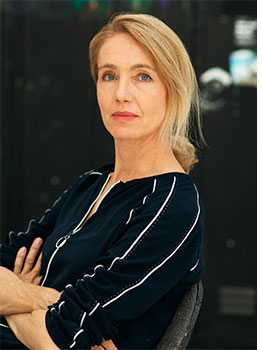 Ursina Lardi (Samedan, Switzerland 1970) is an actor in theatre, film and television. At the age of 22, she moved to Berlin and enrolled in the Ernst Busch acting school. Since 2012, she has been a member of the company of the Schaubühne am Lehniner Platz in Berlin, where she has worked with Thomas Ostermeier, Katie Mitchell, Luk Perceval, Alvis Hermanis, Romeo Castellucci and Milo Rau, with whom she shares the creative and interpretative processes for four extraordinary productions: Compassion. The history of the machine gun; Lenin; Everywoman; and their newest play, The Seer, which premieres in Vienna and Venice in June 2025. Her longstanding and fruitful artistic partnership with independent director and playwright Thorsten Lensing has seen her in many of his productions, including The Cherry Orchard, The Brothers Karamasov, Infinite Jest and Crazy for Comfort. Her roles in film and TV are also numerous, including The White Ribbon (directed by Michael Haneke, Palme d'Or at the Cannes Film Festival 2009); Lore (directed by Cate Shortland, Lola in Bronze 2012) and The Nameless Day (directed by Volker Schlöndorff, 2017), which earned her numerous awards, including the Eliette von Karajan Cultural Fund Award 2006, the Swiss Film Award 2014 (best actress), and the Hans Reinhart Ring 2017, Switzerland's highest award for theatre professionals.
Ursina Lardi (Samedan, Switzerland 1970) is an actor in theatre, film and television. At the age of 22, she moved to Berlin and enrolled in the Ernst Busch acting school. Since 2012, she has been a member of the company of the Schaubühne am Lehniner Platz in Berlin, where she has worked with Thomas Ostermeier, Katie Mitchell, Luk Perceval, Alvis Hermanis, Romeo Castellucci and Milo Rau, with whom she shares the creative and interpretative processes for four extraordinary productions: Compassion. The history of the machine gun; Lenin; Everywoman; and their newest play, The Seer, which premieres in Vienna and Venice in June 2025. Her longstanding and fruitful artistic partnership with independent director and playwright Thorsten Lensing has seen her in many of his productions, including The Cherry Orchard, The Brothers Karamasov, Infinite Jest and Crazy for Comfort. Her roles in film and TV are also numerous, including The White Ribbon (directed by Michael Haneke, Palme d'Or at the Cannes Film Festival 2009); Lore (directed by Cate Shortland, Lola in Bronze 2012) and The Nameless Day (directed by Volker Schlöndorff, 2017), which earned her numerous awards, including the Eliette von Karajan Cultural Fund Award 2006, the Swiss Film Award 2014 (best actress), and the Hans Reinhart Ring 2017, Switzerland's highest award for theatre professionals.
